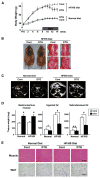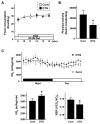Fast/Glycolytic muscle fiber growth reduces fat mass and improves metabolic parameters in obese mice
- PMID: 18249175
- PMCID: PMC2828690
- DOI: 10.1016/j.cmet.2007.11.003
Fast/Glycolytic muscle fiber growth reduces fat mass and improves metabolic parameters in obese mice
Abstract
In contrast to the well-established role of oxidative muscle fibers in regulating whole-body metabolism, little is known about the function of fast/glycolytic muscle fibers in these processes. Here, we generated a skeletal muscle-specific, conditional transgenic mouse expressing a constitutively active form of Akt1. Transgene activation led to muscle hypertrophy due to the growth of type IIb muscle fibers, which was accompanied by an increase in strength. Akt1 transgene induction in diet-induced obese mice led to reductions in body weight and fat mass, resolution of hepatic steatosis, and improved metabolic parameters. Akt1-mediated skeletal muscle growth opposed the effects of a high-fat/high-sucrose diet on transcript expression patterns in the liver and increased hepatic fatty acid oxidation and ketone body production. Our findings indicate that an increase in fast/glycolytic muscle mass can result in the regression of obesity and metabolic improvement through its ability to alter fatty acid oxidation in remote tissues.
Figures







Comment in
-
Fighting fat with muscle: bulking up to slim down.Cell Metab. 2008 Feb;7(2):97-8. doi: 10.1016/j.cmet.2008.01.003. Cell Metab. 2008. PMID: 18249167 Review.
References
-
- Albright A, Franz M, Hornsby G, Kriska A, Marrero D, Ullrich I, Verity LS. American College of Sports Medicine position stand. Exercise and type 2 diabetes. Med Sci Sports Exerc. 2000;32:1345–1360. - PubMed
-
- American Diabetes Association. Diabetes mellitus and exercise. Diabetes Care. 2000;23(Suppl 1):S50–S54. - PubMed
-
- Arany Z, Lebrasseur N, Morris C, Smith E, Yang W, Ma Y, Chin S, Spiegelman BM. The transcriptional coactivator PGC-1beta drives the formation of oxidative type IIX fibers in skeletal muscle. Cell Metab. 2007;5:35–46. - PubMed
-
- Atherton PJ, Babraj J, Smith K, Singh J, Rennie MJ, Wackerhage H. Selective activation of AMPK-PGC-1alpha or PKB-TSC2-mTOR signaling can explain specific adaptive responses to endurance or resistance training-like electrical muscle stimulation. FASEB J. 2005;19:786–788. - PubMed
MeSH terms
Substances
Associated data
- Actions
Grants and funding
LinkOut - more resources
Full Text Sources
Other Literature Sources
Molecular Biology Databases
Research Materials
Miscellaneous

